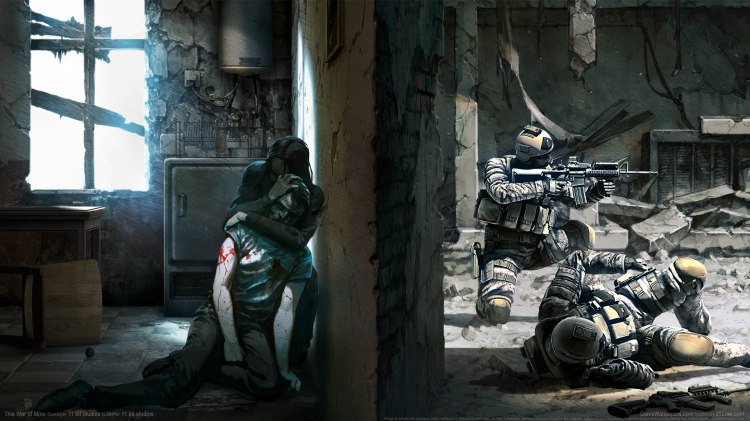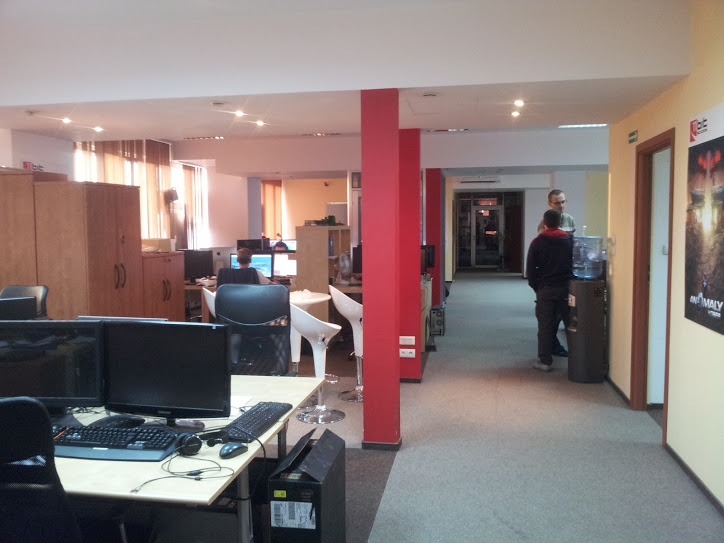The video game industry in Poland is fast becoming one of the most respected and prolific in Europe. GamesBeat spent a week visiting some of the game development and film studios making a worldwide name for themselves. You can read the stories that came out of our visit here, including our in-depth look at the growth of the gaming industry. The Polish government paid for Daniel Crawley’s trip. Our coverage remains objective.
This War of Mine is the total antithesis of Call of Duty and its glossy, ultraviolent spectacle. In this game, war is not fun, it is hell. And survival is the best you can hope for.
While developer 11 Bit Studios insists that This War of Mine is set in an entirely fictional city, the ghosts of Warsaw inevitably linger in the shelled, gray landscape of the game, released on PC, Mac, and Linux last Friday (and reviewed here).
The city of Warsaw was reduced to rubble in the Nazi ‘liquidation’ that followed the failed uprising of 1944. The resistance movement had tried to fight back against the occupying force but was defeated after 63 days of bloody street battles, public executions, and atrocities beyond belief. After the uprising, the German army razed the city to the ground, and where once had lived over a million citizens, there was nothing left but dust and destruction. Around 1,000 people remained in the ruins of their once-great capital, trying to survive.
This desperate struggle for survival is what drives the gameplay in This War of Mine. Scavenging for food each night and trying to stay warm feels dark and real. And that is how it should feel, as this is a game about the forgotten many. The civilians trapped unwittingly in the middle of a warzone.
This War of Mine’s insistence on remaining true to its realistic vision is a credit to 11 Bit, the blossoming Warsaw-based studio that isn’t afraid to show the darker side of war.
Welcome to 11 Bit
11 Bit’s development studio is in an office block in Warsaw’s bohemian Praga District. It’s on the side of the river that best survived the levelling of the city, but if you head just a few blocks away, you can still see the signs of conflict from 70 years ago, such as telltale bullet holes staring out from crumbling walls.
On the main door are the names of the many other companies that share 11 Bit’s building, including a haulage operator and a security firm called Colt Security. I hopped in the lift with two 11 Bit workers back from their break and met up with Karol Zajaczkowski, the studio’s head of marketing, to talk about This War of Mine.
“When you play most war games, it looks like fun,” said Zajaczkowski. “It looks like kids playing in the back yard. We have plastic guns and we shoot and we are the heroes and you are the bad guys. The war doesn’t look like that. It doesn’t look like that for soldiers and, even more, it doesn’t look like that for civilians.”
So 11 Bit set out to make a game that did actually represent war, and it did that by researching exactly what it’s like for civilians caught up in conflicts and speaking to survivors.
“We reached [out] for people from Sarejevo [the city under siege for 1,425 days during the Bosnian War of the 1990s] because it’s one of the closest conflicts, so we were sure that we would find some people that were really there. We contacted some museums and some foundations that helped those people and we told them what kind of game we were doing.
“But it’s hard to get people to speak because they want to forget. They lost their relatives, they lost their homes. And they moved on, and they want to forget that they were there.” They did managed to find some people willing to share their experiences, however, and flew them out to Poland to talk to the team.
This constant reference to real-life conflicts is ongoing, and a Sarajevo survivor had been in the studio just a week before I was there. 11 Bit has also used the input of a former U.S. Marine on the project, offering a different perspective on the grim realities of war. He’d been involved in the bloody, controversial battle of Fallujah in Iraq in 2004 and left the army on his return to the States, suffering with post-traumatic stress disorder.




